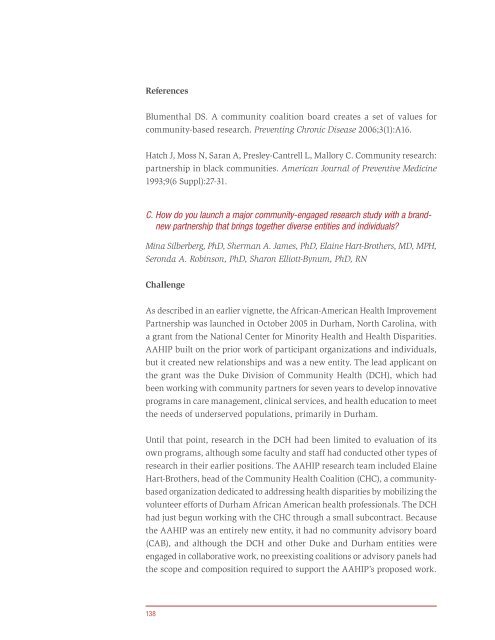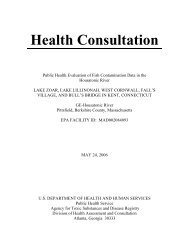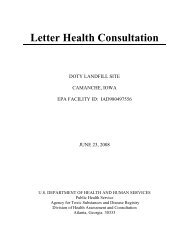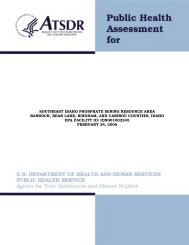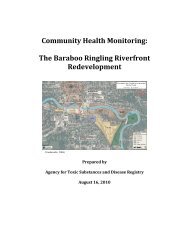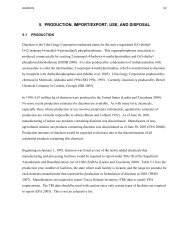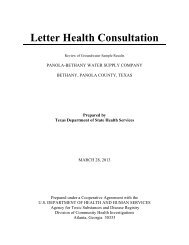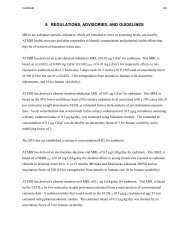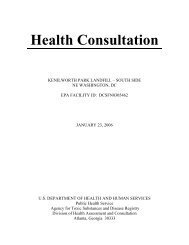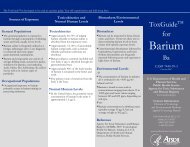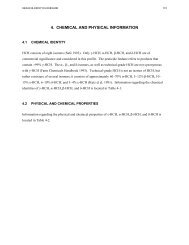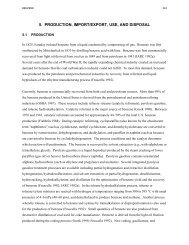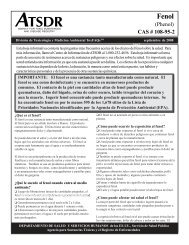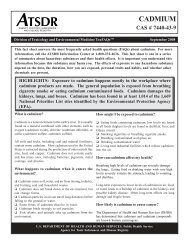Principles of Community Engagement (Second Edition)
Principles of Community Engagement (Second Edition)
Principles of Community Engagement (Second Edition)
Create successful ePaper yourself
Turn your PDF publications into a flip-book with our unique Google optimized e-Paper software.
References<br />
Blumenthal DS A community coalition board creates a set <strong>of</strong> values for<br />
community-based research Preventing Chronic Disease 2006;3(1):A16<br />
Hatch J, Moss N, Saran A, Presley-Cantrell L, Mallory C <strong>Community</strong> research:<br />
partnership in black communities American Journal <strong>of</strong> Preventive Medicine<br />
1993;9(6 Suppl):27-31<br />
C. How do you launch a major community-engaged research study with a brandnew<br />
partnership that brings together diverse entities and individuals?<br />
Mina Silberberg, PhD, Sherman A. James, PhD, Elaine Hart-Brothers, MD, MPH,<br />
Seronda A. Robinson, PhD, Sharon Elliott-Bynum, PhD, RN<br />
Challenge<br />
As described in an earlier vignette, the African-American Health Improvement<br />
Partnership was launched in October 2005 in Durham, North Carolina, with<br />
a grant from the National Center for Minority Health and Health Disparities<br />
AAHIP built on the prior work <strong>of</strong> participant organizations and individuals,<br />
but it created new relationships and was a new entity The lead applicant on<br />
the grant was the Duke Division <strong>of</strong> <strong>Community</strong> Health (DCH), which had<br />
been working with community partners for seven years to develop innovative<br />
programs in care management, clinical services, and health education to meet<br />
the needs <strong>of</strong> underserved populations, primarily in Durham<br />
Until that point, research in the DCH had been limited to evaluation <strong>of</strong> its<br />
own programs, although some faculty and staff had conducted other types <strong>of</strong><br />
research in their earlier positions The AAHIP research team included Elaine<br />
Hart-Brothers, head <strong>of</strong> the <strong>Community</strong> Health Coalition (CHC), a communitybased<br />
organization dedicated to addressing health disparities by mobilizing the<br />
volunteer efforts <strong>of</strong> Durham African American health pr<strong>of</strong>essionals The DCH<br />
had just begun working with the CHC through a small subcontract Because<br />
the AAHIP was an entirely new entity, it had no community advisory board<br />
(CAB), and although the DCH and other Duke and Durham entities were<br />
engaged in collaborative work, no preexisting coalitions or advisory panels had<br />
the scope and composition required to support the AAHIP’s proposed work<br />
138


